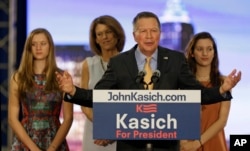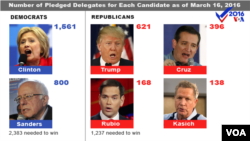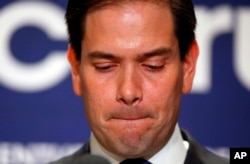Republican Donald Trump and Democrat Hillary Clinton have taken commanding leads in their months-long campaigns to claim their parties' 2016 U.S. presidential nominations, with both scoring impressive victories in contests on Tuesday.
Neither Trump, a billionaire real estate mogul who has never held elective office, nor Clinton, the country's secretary of state from 2009 to 2013, has clinched a majority of delegates to their national party conventions in July to be assured of their party nominations, but both have built substantial leads over their remaining challengers.
Of the two, Clinton's path to the nomination seems more assured.
Clinton, looking to become the first female U.S. president, won four states Tuesday over her sole challenger, Vermont Senator Bernie Sanders, and is leading in a fifth where votes are still being counted. She won contests in Florida, North Carolina, Ohio and Illinois, and holds a small lead in Missouri.
Clinton, the wife of former President Bill Clinton, has now won 66 percent of the convention delegates she needs for the Democratic nomination as the focus turns to voting in more state contests that run through June 14.
The next Democratic contests are set for March 22 in the western states of Arizona, Idaho and Utah.
Flamboyant candidate
The flamboyant Trump, a one-time television reality show host, has amassed slightly more than half of the convention delegates he needs to win the Republican nomination.
Trump, however, would need to win about 60 percent of the remaining available delegates in 21 state-by-state party contests to claim his party's nomination before the convention.
His closest challenger is Texas Senator Ted Cruz, a conservative lawmaker who delights in aiming barbs at the Washington political establishment, Democratic and Republican leaders alike.
Cruz said the race has culminated in a head-to-head match with Trump through the remaining party nominating contests, but Ohio Governor John Kasich won his home state Tuesday over Trump and remains in the race.
Contentious battle
Kasich, however, cannot mathematically win the nomination before the convention and is hoping neither Trump nor Cruz has enough pledged delegates either, throwing the contest into a contentious battle at the quadrennial gathering.
Trump said it is time to bring the Republican Party together, vowing he will not stop until he "wins the country."
Trump's resounding victory in the southeastern state of Florida, where he has a lavish second home estate, forced Florida Senator Marco Rubio to quit the race in an election night concession speech.
Numerous establishment Republican figures had endorsed Rubio in hopes of stopping Trump, who many Republicans believe would lose November's national election to Clinton, a contention supported by numerous surveys showing her winning a hypothetical match over Trump.
The winner of the election will succeed President Barack Obama, a Democrat who leaves office in January 2017.
After polls closed Tuesday, Cruz said it is time for Republicans to unite behind his candidacy, noting that he has won several state contests against Trump in recent weeks.
Cruz welcomed to his campaign those who had supported Rubio, saying, "America has a clear choice going forward."
Unpredictable
Numerous Republicans, including Cruz, say Trump is too unpredictable and has over the years adopted numerous policy positions tha are at odds with the dominant conservative party philosophy.
One major anti-Trump group has been running a nationwide television ad in recent days, quoting his many comments disparaging women and another pointing attention to the melees that have broken out at some of his rallies between his supporters and those opposed to his candidacy.
After Tuesday's results, former House of Representatives Speaker John Boehner endorsed his successor, House Speaker Paul Ryan, the losing 2012 Republican vice presidential candidate, to be the party's presidential nominee over Trump, Cruz and Kasich.
Trump said his run for the White House has drawn new voters to the Republican contests, many of them angry at being ignored by Washington and Republican elites.
He has struck a chord with some voters with his calls for construction of an impenetrable wall along the U.S. southern border with Mexico to stem the flow of illegal immigrants into the U.S. and temporarily banning the entry of all Muslims into the United States.
WATCH: Related video by VOA's Jim Malone









